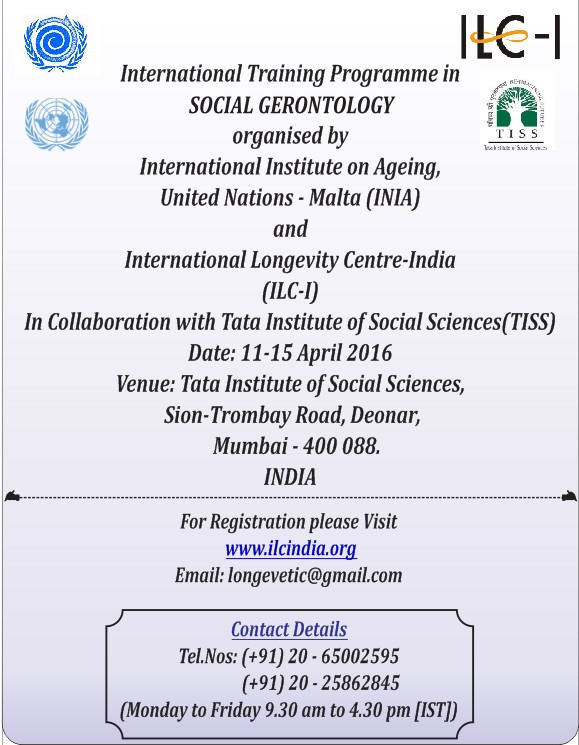21st January 2016
The International Longevity Centre-India (ILC-I) is the Satellite Centre of the United Nations’ International Institute on Ageing, Malta for the SAARC region.
This Satellite Centre, in collaboration with the Tata Institute of Social Sciences (TISS), Mumbai is organising the ‘in situ’ international training programme of UN INIA Malta, on “Social Gerontology” from the 11th to the 15th or April 2016 at the TISS campus in Mumbai.
TOPICS TO BE COVERED
The programme consists of lectures and topics dealt with are: A global perspective on Population Ageing; Key concepts in gerontology; Social aspects of ageing; Economic aspects of ageing; Psychological aspects of ageing; Health aspects of the older persons; The Madrid International Plan of Action on Ageing (I): Older persons and development; The Madrid International Plan of Action on Ageing (II): Health Promotion and wellbeing; Medical Conditions experienced by the Older Persons; Policies on older persons in India; Maintenance & welfare of parents / Senior Citizens Act of India 2007; Feminisation of ageing; Intergenerational solidarity; The Madrid International Plan of Action on Ageing (III): Ensuring enabling and supportive environments; Active-ageing policies for low-income countries; Caregiving of older persons; Communication with older persons; Programmes and schemes for elderly in India; Social Policies and services in the community; Elder Abuse; Quality of life in old age; Dementia & its implications on the individual and the family; Ageing and Disability; Healthy Nutrition in the elderly; Older Persons in the changing role of the family; Socio-economic implications of Population Ageing in India; National Minimum standards for care homes for older persons.
WHO SHOULD ATTEND THIS COURSE
Applications are invited from social workers, academicians, health professionals and others interested in the field of Ageing from SAARC countries.
More details about this programme are available on the ILC-I website – www.ilcindia.org

A Shared Vision for Global Longevity of Rayne and Susana (newly elected Co-Presidents)
It is a profound honour to serve as Co-Presidents of the International Longevity Centre Global Alliance. Our partnership reflects the very spirit of the Alliance: global in reach, grounded in local realities, and united by a shared commitment to dignity, equity, and wellbeing across the life course.
27th January 2026
VNRs of HLPF at the UN: The 2030 Agenda for Sustainable Development
Voluntary national reviews (VNRs) were held at High-Level Political Forum on Sustainable Development (HLPF) from 14 to 24 July 2025, UN, New York. Each State shared Experiences and Lessons on the 2030 Agenda and SDGs implementation.
24th July 2025
The Intersectionality of Ageism & Sexism: Harnessing The Power of Older Women
During the 2025 UN High Level Political Forum, the ILC Global Alliance and partners hosted a side event to address the intersection of ageism and sexism, advocating for a UN convention to protect the rights of older persons.
16 July 2025


